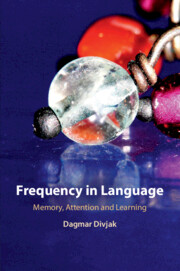Introduction
Published online by Cambridge University Press: 26 September 2019
Summary
What you do often, you do better and faster. This is because repetition freezes behaviour into something you can do without thinking, such as swimming, riding a bike, driving a car, and speaking your mother tongue. That is right – speaking your own language can be regarded as a behaviour that is sensitive to frequency. Children, for example, learn words sooner if they hear them often. A child’s first word will typically be something they hear a lot: mummy, daddy, teddy are good candidates because they are frequent (and useful). Adults read and recognize high-frequency words more quickly than low-frequency words. You may have had the experience of reading a word you do not see very often, such as blur, and accidentally replacing it with a word like blue that you do encounter often. Words that are used often are also more robustly represented in memory.
- Type
- Chapter
- Information
- Frequency in LanguageMemory, Attention and Learning, pp. 1 - 12Publisher: Cambridge University PressPrint publication year: 2019



